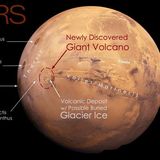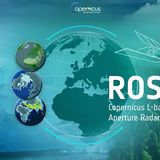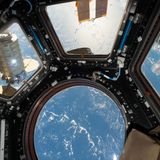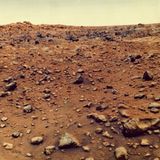Transcribed
S27E35: Red Planet Revelation: Mars Hides an Ancient Volcanic Behemoth
Mar 20, 2024 ·
31m 54s
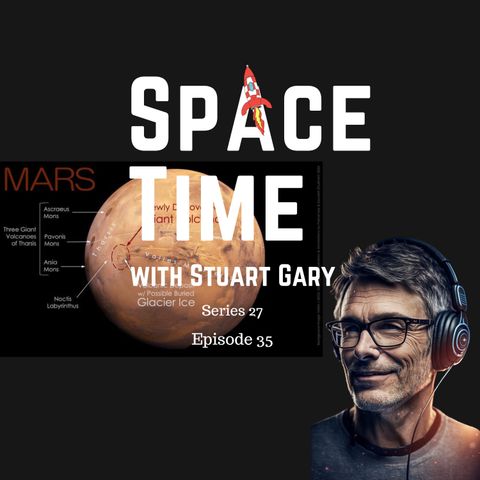
Download and listen anywhere
Download your favorite episodes and enjoy them, wherever you are! Sign up or log in now to access offline listening.
S27E35: Red Planet Revelation: Mars Hides an Ancient Volcanic Behemoth
Chapters
Description
The Space, Astronomy & Science Podcast. SpaceTime Series 27 Episode 36 *Mars Unveils a Colossal Volcanic Secret Astronomers have discovered a massive ancient volcano on Mars, hidden beneath an ice...
show more
The Space, Astronomy & Science Podcast.
SpaceTime Series 27 Episode 36
*Mars Unveils a Colossal Volcanic Secret
Astronomers have discovered a massive ancient volcano on Mars, hidden beneath an ice sheet in the planet's Tharsus volcanic province. This behemoth, which has eluded detection by orbiting spacecraft since 1971, could offer new insights into the Red Planet's geologic past and potential for life. The structure, tentatively named Noctus Volcano, stands over 29,600 feet tall and spans about 280 miles across. Its discovery near the labyrinthine Noctus Labyrinthus and the colossal Valles Marineris suggests a long history of volcanic activity and hints at the presence of glacial ice beneath its surface.
*Europe's New Radar Mission to Monitor Climate Change
The European Space Agency is gearing up for ROSAL, a cutting-edge Earth observation mission set to scrutinize the planet's oceans, land, and ice. With the largest deployable planar antenna array ever built, ROSAL will complement existing Copernicus Sentinel missions by using L-band radar to penetrate vegetation and ice, providing invaluable data for climate change research, agriculture, and geohazard monitoring.
*International Space Station's Revolving Door
It's been a bustling period aboard the ISS with multiple crew rotations. Axiom Space's third private mission has concluded, paving the way for their fourth venture and future space station modules. The arrival of NASA's SpaceX Crew-8 promises six months of groundbreaking experiments, including 3D organoid growth to study diseases. Meanwhile, SpaceX Crew-7's departure marks the end of a mission filled with over 250 experiments, ranging from immune cell behavior in microgravity to artificial retina production.
*AI Robot Chemist Could Pave the Way for Martian Oxygen Production
Scientists have developed an AI-powered robot chemist capable of extracting oxygen from Martian meteorites. This breakthrough suggests that future Mars missions might sustain human life and fuel rockets using the Red Planet's own resources. The AI robot's ability to identify and react chemicals to produce oxygen could revolutionize space exploration logistics and support long-term colonization efforts.
For more SpaceTime and to support the show, visit our website at https://spacetimewithstuartgary.com where you can access our universal listen link, find show notes, and learn how to become a patron.
Listen to SpaceTime on your favorite podcast app with our universal listen link: https://spacetimewithstuartgary.com/listen and access show links via https://linktr.ee/biteszHQ
Support the show: https://www.spreaker.com/podcast/spacetime-with-stuart-gary--2458531/support
For more space and astronomy podcasts, visit our HQ at https://bitesz.com
📋 Episode Chapters
(00:00) Could a robotic chemist create oxygen from resources already on Mars
(00:27) Giant ancient volcano and glacial ICE sheet discovered on Mars
(07:13) European Space Agency planning new Earth observation mission to monitor climate change
(16:23) Roselle is an operational mission that acquires data all the time
(18:02) SpaceX launched a Dragon capsule bound for the International Space Station last month
(20:48) Could robotic chemist create oxygen out of resources already available on Mars
(22:55) High temperatures over 33 degrees Celsius increase risk of stroke, study finds
(25:28) American politicians want to ban TikTok over concerns about propaganda on social media
(27:34) Metta have decided they will not pay for news content on Facebook
(28:50) Microsoft are about to make some big announcements with new releases
show less
SpaceTime Series 27 Episode 36
*Mars Unveils a Colossal Volcanic Secret
Astronomers have discovered a massive ancient volcano on Mars, hidden beneath an ice sheet in the planet's Tharsus volcanic province. This behemoth, which has eluded detection by orbiting spacecraft since 1971, could offer new insights into the Red Planet's geologic past and potential for life. The structure, tentatively named Noctus Volcano, stands over 29,600 feet tall and spans about 280 miles across. Its discovery near the labyrinthine Noctus Labyrinthus and the colossal Valles Marineris suggests a long history of volcanic activity and hints at the presence of glacial ice beneath its surface.
*Europe's New Radar Mission to Monitor Climate Change
The European Space Agency is gearing up for ROSAL, a cutting-edge Earth observation mission set to scrutinize the planet's oceans, land, and ice. With the largest deployable planar antenna array ever built, ROSAL will complement existing Copernicus Sentinel missions by using L-band radar to penetrate vegetation and ice, providing invaluable data for climate change research, agriculture, and geohazard monitoring.
*International Space Station's Revolving Door
It's been a bustling period aboard the ISS with multiple crew rotations. Axiom Space's third private mission has concluded, paving the way for their fourth venture and future space station modules. The arrival of NASA's SpaceX Crew-8 promises six months of groundbreaking experiments, including 3D organoid growth to study diseases. Meanwhile, SpaceX Crew-7's departure marks the end of a mission filled with over 250 experiments, ranging from immune cell behavior in microgravity to artificial retina production.
*AI Robot Chemist Could Pave the Way for Martian Oxygen Production
Scientists have developed an AI-powered robot chemist capable of extracting oxygen from Martian meteorites. This breakthrough suggests that future Mars missions might sustain human life and fuel rockets using the Red Planet's own resources. The AI robot's ability to identify and react chemicals to produce oxygen could revolutionize space exploration logistics and support long-term colonization efforts.
For more SpaceTime and to support the show, visit our website at https://spacetimewithstuartgary.com where you can access our universal listen link, find show notes, and learn how to become a patron.
Listen to SpaceTime on your favorite podcast app with our universal listen link: https://spacetimewithstuartgary.com/listen and access show links via https://linktr.ee/biteszHQ
Support the show: https://www.spreaker.com/podcast/spacetime-with-stuart-gary--2458531/support
For more space and astronomy podcasts, visit our HQ at https://bitesz.com
📋 Episode Chapters
(00:00) Could a robotic chemist create oxygen from resources already on Mars
(00:27) Giant ancient volcano and glacial ICE sheet discovered on Mars
(07:13) European Space Agency planning new Earth observation mission to monitor climate change
(16:23) Roselle is an operational mission that acquires data all the time
(18:02) SpaceX launched a Dragon capsule bound for the International Space Station last month
(20:48) Could robotic chemist create oxygen out of resources already available on Mars
(22:55) High temperatures over 33 degrees Celsius increase risk of stroke, study finds
(25:28) American politicians want to ban TikTok over concerns about propaganda on social media
(27:34) Metta have decided they will not pay for news content on Facebook
(28:50) Microsoft are about to make some big announcements with new releases
Information
| Author | bitesz.com |
| Organization | bitesz.com |
| Website | spacetimewithstuartgary.com |
| Tags |
Copyright 2024 - Spreaker Inc. an iHeartMedia Company

